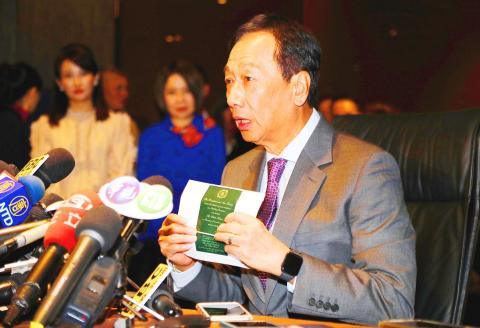Osaka, Japan-based Sharp Corp, a subsidiary of Hon Hai Precision Industry Co (鴻海精密), yesterday said that it is to demonstrate its prototype 5G smartphone at Information Technology Month, its first participation in the nation’s annual electronics trade show.
The show opens at the Taipei World Trade Center’s Exhibition Hall 1 today and runs through Sunday.
The 5G smartphone is scheduled to go on sale in Japan in the first half of next year, Sharp said, adding that sales would depend on the progress of 5G technology development in the nation.

Photo: CNA
In Taiwan, the government has designated next year the first of the 5G era and is to hold 5G spectrum auctions for local telecoms from Tuesday next week.
Asia Pacific Telecom Co (亞太電信), another Hon Hai subsidiary, is among the five Taiwanese telecoms that plan to take part in the auction.
Sharp also plans to showcase a 120-inch 8K high resolution flat panel, the world’s smallest 8K camera, Dynabook notebook computers and smart family applications at the show.
It plans to introduce a cloud technology-based app that monitors indoor air quality and can run air purifiers in an effective and efficient way, Sharp said.
After the Taipei event, the show moves to Taichung from Thursday next week to Dec. 16, Tainan from Dec. 19 to Dec. 23 and Kaohsiung from Dec. 26 to Dec. 30.
Separately, FIH Mobile Ltd (富智康), another Hon Hai subsidiary, is to invest US$99.99 million in India to boost its efforts to develop mobile phones, communications devices and other electronic gadgets.
FIH Mobile said its production facility in India is one of the largest contract electronics makers in the nation, and the new investment is expected to help the company optimize its production process and boost output to secure more orders from Chinese customers with operations in India.
The company’s five largest customers account for 89.6 percent of its sales, with Sharp making up 8.5 percent, FIH Mobile said.

MULTIFACETED: A task force has analyzed possible scenarios and created responses to assist domestic industries in dealing with US tariffs, the economics minister said The Executive Yuan is tomorrow to announce countermeasures to US President Donald Trump’s planned reciprocal tariffs, although the details of the plan would not be made public until Monday next week, Minister of Economic Affairs J.W. Kuo (郭智輝) said yesterday. The Cabinet established an economic and trade task force in November last year to deal with US trade and tariff related issues, Kuo told reporters outside the legislature in Taipei. The task force has been analyzing and evaluating all kinds of scenarios to identify suitable responses and determine how best to assist domestic industries in managing the effects of Trump’s tariffs, he

TIGHT-LIPPED: UMC said it had no merger plans at the moment, after Nikkei Asia reported that the firm and GlobalFoundries were considering restarting merger talks United Microelectronics Corp (UMC, 聯電), the world’s No. 4 contract chipmaker, yesterday launched a new US$5 billion 12-inch chip factory in Singapore as part of its latest effort to diversify its manufacturing footprint amid growing geopolitical risks. The new factory, adjacent to UMC’s existing Singapore fab in the Pasir Res Wafer Fab Park, is scheduled to enter volume production next year, utilizing mature 22-nanometer and 28-nanometer process technologies, UMC said in a statement. The company plans to invest US$5 billion during the first phase of the new fab, which would have an installed capacity of 30,000 12-inch wafers per month, it said. The

Taiwan’s official purchasing managers’ index (PMI) last month rose 0.2 percentage points to 54.2, in a second consecutive month of expansion, thanks to front-loading demand intended to avoid potential US tariff hikes, the Chung-Hua Institution for Economic Research (CIER, 中華經濟研究院) said yesterday. While short-term demand appeared robust, uncertainties rose due to US President Donald Trump’s unpredictable trade policy, CIER president Lien Hsien-ming (連賢明) told a news conference in Taipei. Taiwan’s economy this year would be characterized by high-level fluctuations and the volatility would be wilder than most expect, Lien said Demand for electronics, particularly semiconductors, continues to benefit from US technology giants’ effort

‘SWASTICAR’: Tesla CEO Elon Musk’s close association with Donald Trump has prompted opponents to brand him a ‘Nazi’ and resulted in a dramatic drop in sales Demonstrators descended on Tesla Inc dealerships across the US, and in Europe and Canada on Saturday to protest company chief Elon Musk, who has amassed extraordinary power as a top adviser to US President Donald Trump. Waving signs with messages such as “Musk is stealing our money” and “Reclaim our country,” the protests largely took place peacefully following fiery episodes of vandalism on Tesla vehicles, dealerships and other facilities in recent weeks that US officials have denounced as terrorism. Hundreds rallied on Saturday outside the Tesla dealership in Manhattan. Some blasted Musk, the world’s richest man, while others demanded the shuttering of his